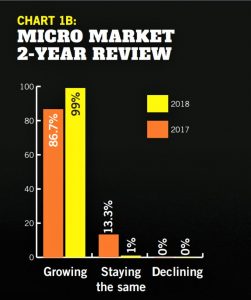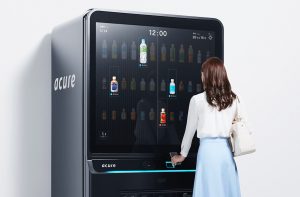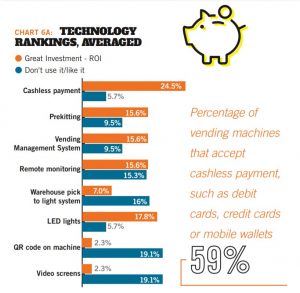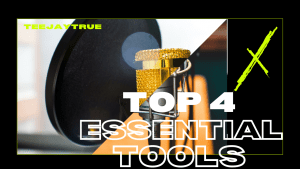More often than not, when people talk about starting a business, they envision a Forbes 100 type of business with high-profile clients who sign big checks for the goods and services provided. A prudent businessperson knows different – when thinking of business, think in terms of dollars and cents and not glamour and celebrity status. We are not talking about chump change businesses either. We are referring to a normally overlooked money maker, for instance, a lucrative vending machine business.
Depending on your business structure, vending machines are a source of passive income. Once you purchase a machine and set it up, your only responsibility will be to collect cash and to ensure that it is stocked and running smoothly.
In today’s busy world, where people barely have time to walk to and or sit in a restaurant, food vending machines offer sandwiches, coffee, chips, soft drinks, etc. Vending machines are conveniently located in schools, hospitals, office buildings, shopping centers, malls, etc. Unsurprisingly, the vending machine industry earns billions of dollars in revenue annually.

In 2018, the industry earned $23.5 billion, with medium-sized operators representing 25.3% of the total number of vending machine owners, earning between $1 million – $4.9 million.
The excellent news is that in 2020, you can still get in on the action and start a profitable vending machine business today! All it will require of you is a bit of research, a good strategy, and, most importantly: financing.
This article will encourage you to take your first steps towards launching a successful vending business. We will talk about how to start and finance your own vending machine business and also discuss the pros and cons of the industry.
How A Vending Machine Business Works
You are probably aware of how a vending machine works, from a consumer’s perspective – if you are thirsty or hungry, all you need to do is select an item, insert a dollar or credit card, get your beverage or snack, and some change. Simple!
However, this process begs the question, what happens to the money that you put in the machine? Where does it go? Well, the entrepreneurial mind will be happy to discover that it all goes directly to the owner of the vending machine.
The vending machine owner will usually have a contract with another business, allowing him/her to have their vending machine in their establishment. These contracts include details like expected commissions to be paid to the “owners” of the location, in exchange for providing a location/space for the machine.

On installation, the vending machine business owner is responsible for keeping the machine fully stocked and in working order. Money collected from the machine will cover maintenance costs and or machine rental, purchase additional inventory, pay commissions and or location fees according to the contract, and expand the business. Upon covering all business expenses, the vending machine owner will pocket the profits.
Vending machines are used in:
· Airports
· Apartment Complexes
· Car washes
· Correctional facilities
· Elementary, middle, and high schools schools/Colleges/Universities
· Hospitals, nursing homes
· Hotels/Motels
· Laundromats
· Military bases
· Office buildings
· Restaurants/Pubs/Clubs
· Retail sites
· Shopping Centers & Malls
· Stadiums, etc.
The products stocked in vending machines include cold beverages, candy, confections, healthy, snacks, hot beverages, ice cream/frozen, and other (includes non-edibles), etc.
The Pros and Cons of a Vending Machine Business
Pros
Flexibility
A vending machine affords you with flexibility, as far as time is concerned. You do not have to be “on the clock” to ensure that your devices and business is running smoothly. Monitor your machines (even remotely), perform maintenance and refill stock as needed. You do not need to monitor employees or devote your time to watching over your business 24/7. A vending machine allows you to make passive income while freeing up your time so that you can focus on hobbies, family, and any other business ventures.
Lower Start-up Costs
Any start-up business needs capital to cover expenses. You may have to hire employees, rent, purchase or lease commercial space, and purchase furniture and office equipment – the list goes on. A vending business bypasses most start-up costs. Obviously, you’ll still have expenses such as purchasing or renting vending machines, obtaining inventory, maintenance costs, and hiring an employee or two to restock your machines. However, compared to other ventures, the vending business model has substantially low overheads.
Trusted Business Model
Unlike other new business ideas, the vending machine business is tried and true and has been proven successful in the USA market for over half a century – you will not be introducing a new and risky product into the market. Neither will you be operating a complicated business that requires a business degree and or expertise. The only requirements will be to have a business and marketing strategy so that you can sell your company and products to potential clients. Anyone can get started, regardless of their inexperience in entrepreneurship.

Cons
Patience and profits
Though the vending industry reaps billions of dollars every year, it will be a slow and patient walk to million-dollar profits. It may take a company up to a year to realize any profit from your vending machines. So, get into the vending machine business with a solid strategy, realistic expectations, and lots of patience.
Expenses
Though venturing into the vending industry is not as expensive as other industries, there are costs involved. To start your business, you’ll be required to invest in at least one machine. A used machine may be priced as low as $1,200, while a new one can set you back $10,000 or more. A company should expect to spend a lot of money if planning to start a business with more than one vending machine.
Other expenses include operating costs, in particular, inventory. You can save tons by working with a vendor or by buying items from big box stores, in bulk. Inventory is an ongoing expense that needs capital and positive cash flow.
With expansion comes additional costs. You may start your business with no staff because you can restock machines yourself. This will affect the passive income side of this business. However, in order to expand, you will need to upgrade or add new machines, hire an employee or two to ensure that your machines are fully stocked, and purchase a company vehicle for restocking purposes.
Most business owners start slowly with out-of-pocket funds and later seek help from financial institutions. This is where applying for loans comes into play – we will discuss this briefly in the equipment and inventory section.
Ways to Start a Vending Machine Business
Option 1
It is essential to understand the three main ways you can start a vending machine business. You can buy a pre-existing business, buy a vending machine franchise, or start from scratch.
Option 1: Starting From Scratch
The very first option is to start your business from scratch. This will obviously require a bit more legwork from you because you have to scout locations and enter into contractual agreements with other business owners.
Begin by scouting out the best locations in your local area. More on this later. Once you have located a suitable spot, you will need to work out a contract with the owner of the establishment. The agreement will allow you to have your machines at their site of business at a negotiated cost. This amount will usually be 10-20% of your gross sales.
After you have your locations mapped out and locked into contracts, you will be able to purchase vending machines. Do not buy machines until you find appropriate sites so that you can select the type of vending machines suitable for each place. For example, you might get a contract with a gym that needs healthy snacks and spring water, or with a university that requires condom dispenser machines only.
The final step is to ensure that your machines are well maintained and fully stocked. A machine that runs out of items or breaks down often will lose money. Keep a constant tab on your inventory so that you can know which are the best-selling products (per site) and which items don’t sell well so as to maximize your profits.
On the legal front, conduct thorough research on the rules and regulations governing the vending machine business in your area. Laws vary by state, so before diving headfirst into launching your business, find out all the business registration and operational requirements from your local chamber of commerce.

Option 2
Buy A Pre-Existing Business
The second option is to purchase a pre-existing business. This is a less intensive start-up route, assuming that you are buying a company that is not in the red, has good accounting records, and fully discloses the health of the business. In this arrangement, you buy an existing business that has the necessary equipment and also locations secured with contracts.
The advantage to this option is that it provides you with a more turn-key operation. It is, however, often the most expensive option. You are, after all, not just purchasing the inventory and equipment – you are also taking over existing contracts.
It is advisable that you have some business experience because you will be taking over a fully functioning business. You will also need to have capital ready and secured to purchase the vending company.
Option 3
A Vending Machine Franchise
Buying a vending machine franchise is stress-free, and the most convenient of the three options. A person without any business experience can be a successful entrepreneur through a franchise’s tried-and-true business model.
The downside to a franchise arrangement is that it can be more expensive than starting your own business. In certain instances, it may prove to be even more costly than buying an already established business! The steep start-up costs are due to the franchise fees which are required to get you started, in addition to the percentage of profits that you are required to pay to the franchisor. Some franchises may require you to use their brand of vending equipment, which could cost more than the usual market prices.
Look for Strategic Locations
Vending machine placement is critical to the success of your business. If your vending machines are not strategically placed in high traffic areas, you could lose money. A strategic location could be a hospital, a military base, or any other public space. In addition to picking traffic-heavy areas, you may want to scope out your competition to make sure that you have little or no competition whatsoever. This will enable you to enjoy high sales and therefore good profits.
It is also critical to your business that you take the time to research the crime rate in all the sites you’re considering. Do not overlook this step – you do not want to suffer losses via vandalism and theft.
On finding places that meet your criteria, set up meetings with the owners to find out if you are a good match. Be bold and ask specific questions during these meetings, for example, whether any contracts exist with other vending machine companies, an estimate of daily foot traffic, and the percentage commission that the business owner wants.
Keep in mind that your machine’s locations will heavily influence the type of products that you stock. Place vending machines where they are most needed, and with the required product. For instance, an office building would do well with a coffee and tea vending machine, a local park would need a snacks and soft drinks machine, while a local laundromat would need a vending machine that dispenses fabric softener and detergent.
Make sure that you have a properly drafted contract to be signed by the property or business owner. The contract should specify details such as the duration of the contract, types, and numbers of machines to be provided, commissions, and any termination clauses. All parties involved should sign and have copies of the contract.
Once you have your locations contractually secured and your vending machines in place, be careful to provide excellent service. The best form of advertising and the most affordable is word of mouth – it is affordable because it is free. By providing exceptional service and quality products, and by listening to your customers’ product requests, you can get referrals organically that will bring you more contracts and increased revenue.

Find and Purchase Vending Machines
Should you decide to start a vending business from scratch, you will need to find and purchase machines. After this investment, you will need to add vending machines or replace outdated or broken machines.
Unfortunately, vending machines are generally expensive – especially when new. A used and basic model may cost around $1,000, while a new machine may run into the thousands of dollars per unit. The more expensive version of vending machines has credit card readers and a glitzier appearance.
Though expensive to purchase, the newer models are advantageous because traditional machines only accept cash. Therefore, the primary advantage of buying new versions of vending machines is to access more customers. Few people carry cash, so the recent versions of vending machines enable customers to purchase merchandise with debit or credit cards, or even their smartphones.
According to Vending Market Watch Report 2019, most consumers spend up to 32% more when paying via card, as compared to cash. In addition, over 59% of vending machines in the USA accept cashless payments, with 24.5% of operators deeming cashless payments and credit card readers as a good investment (ROI).
The new-age machines are also equipped with monitoring systems that let a business owner check inventory, keep track of sales, and monitor maintenance needs from the comfort of their office or home. These advanced machines save you the hassle of visiting each location to check inventory levels, therefore preventing unnecessary trips while helping you ensure that your machines are always fully stocked and working well.
There are several ways to go about buying a vending machine. Used machines can be purchased through auction sites or online classifieds. Only authorized dealers should supply you with new vending machines. Check local business directories and listings to find one in your locality.
Equipment Financing
Whether you purchase machines that are basic or advanced, new or used, cash or cashless, to buy vending machines, you will require capital. One option is equipment financing, which is a type of business loan used to purchase equipment. This loan enables businesses to buy expensive equipment and repay the loans in smaller manageable payments.
With equipment financing, you have one of two options; equipment loans and equipment leases. With an equipment loan, you pay a down payment that is 10-20% of the equipment’s price. The vending machine company takes immediate possession of the equipment and pays the lender over a set period, either on a weekly or monthly basis. Once the loan and interest are fully paid, ownership of the equipment reverts to the business.
A down payment is required with leasing, and the vending machine company takes immediate possession of the equipment. The lessee pays the lessor over a set period, either on a weekly or monthly basis. However, unlike the previously mentioned loan arrangement, most leasing periods are for a short term – two to three years at most. For this reason, once a leasing term is over, one is required to sign a new lease for new equipment.
Some lenders allow businesses to purchase vending machines outright. However, leasing may be advantageous if you don’t have enough capital to start. Please be aware that leasing may significantly cut into your profits.

Source and Purchase Vending Machine Inventory
Inventory is an ongoing expense in a vending machine business. It is a business’s responsibility to keep all machines well-stocked, so inventory must always be readily available. To maximize profits, source your products from an affordable supplier who offers quality products at the lowest price per unit. Start by checking your local wholesale store. Buying items in bulk is the best way to save money because you receive additional discounts for larger orders. If possible, buy some of your inventory directly from the manufacturer, effectively cutting out any middlemen.
Depending on the product, stocking a vending machine is usually not expensive. If you have multiple vending machines with high sales and a thriving business, you will need to consider outside financing for inventory purposes.
Vending Market Watch stated in their 2018 report that in 2017:
- Candy sold via vending machines made $2.6B in revenue, with chocolate earning $1.8B, representing 70.7% of the candy sold
- Snacks sold via vending machines made $4.4B in revenue, with chips earning $2.3B, representing 53.1% of the snacks sold
- Drinks sold via vending machines made $4.5B in revenue, with 16-20oz sodas earning $2.2B, representing 48.2% of the drinks sold

Consider obtaining a business credit card and or a business line of credit to finance your inventory. A business credit card is like a personal credit card; the only difference being that it is used to cover business expenses only. The issuer typically sets a limit so that you can make several purchases up to the given limit. You can use the credit limit at brick and mortar retail stores, or online with vendors who accept credit cards. Each month, you will make a payment that will be applied towards your interest and balance. Funds become available as your balance reduces.
A business line of credit is another good option for purchasing inventory. With this option, a lender sets a credit limit based on the performance of your business or creditworthiness. You will draw funds from your line of credit, which is thereafter transferred to your business account. Upon loan and interest repayment, funds become available to withdraw.
Both lines of credit and a business credit card are useful because they provide you with on-demand funding and keep you afloat during difficult financial seasons.
Accounting and Management Software
Regardless of the size of your business, it is vital that you keep up with your finances to ensure a well-functioning and successful vending machine business. Utilizing an accounting software is the best and most efficient way to keep tabs on your company’s financial health. Using accounting software gives you insight and snapshots of your revenue expenditure, helps you in the day-to-day operations of your business, and runs accounting reports. Having your books up to date also helps during tax season and when applying for business financing.
Some accounting software programs offer advanced features that can store contact information and track inventory. They are also easy to use, so those without accounting experience need not worry.
Management software and tools are also a critical component to help you in the running of your business. Vending machine software has features that enable businesses to:
- Manage inventory
- Manage machines remotely
- Optimize inventory routes
- Write financial reports
Finally, with the right strategy in place, a vending machine business can prove to be very lucrative. Be diligent and conduct thorough research, calculate the cost of owning and operating a vending machine company, and get financing from reasonable lenders. Have fun!

Closing the Gap: Uniting for Equitable Black Generational Wealth
Let’s stand up for fairness, rewrite the rules, and create a world where everyone has a real shot at success.

Bridging the Wealth Gap: Efforts Towards Equitable Solutions
Introduction: Bridging the Divide – Understanding the Wealth Gap A Persistent Disparity in Wealth: Unveiling the Divide The landscape of the United States is characterized

The 4 Essential Tools You NEED for Audiobook Narration
It doesn’t have to be expensive. No need for fancy bells and whistles! It only needs to work.